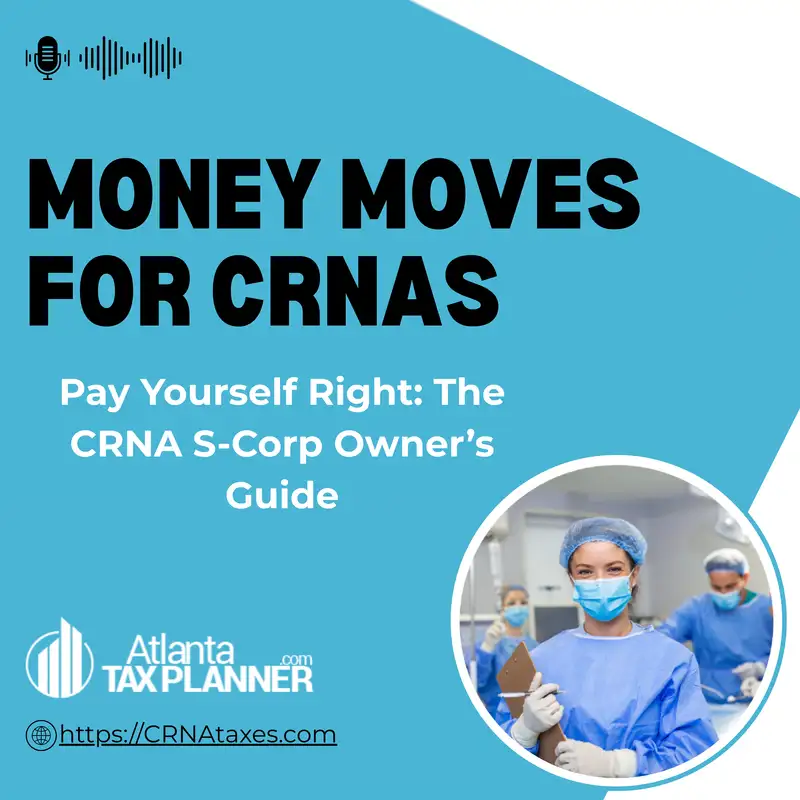Reasonable Compensation Explained for CRNA S-Corp Owners, Pay Yourself Right!
Download MP3Bill White:
Welcome back to Money Moves for CRNAs, where we turn complex tax and business topics into simple, actionable insights.
Last time, we wrapped up our CRNA tax playbook, learning how to delay taxes when income is high, convert to Roth when it's lower, and even use market downturns to grow tax-free. Today, we're breaking down one of the IRS's favorite topics, what reasonable compensation really means for S-Corp owners.
This podcast comes to you twice a month, always short, simple, and designed to make your money work smarter. This podcast is for educational purposes only. For personalized advice, talk with a qualified tax or financial advisor.
Now here's your host, Randy Larkin, CPA from Atlanta Tax Planner.
Randy Larkin:
Hey there, this is Randy Larkin. Today, we're going to tackle what reasonable compensation really means.
Here's the short version. Reasonable compensation is the salary an S-Corp owner pays themselves for the work they do. It's basically the amount you'd pay someone else to perform the job.
If you work in your own S-Corp, you manage clients, do the work, or make key decisions, the IRS says you must pay yourself a fair wage before taking profit distributions. The key difference? Salary is subject to Social Security and Medicare taxes. Distributions are not. This is why the area gets so much IRS attention. Underpaying yourself means underpaying payroll taxes, and that's a red flag.
Why it matters? When the IRS audits S-Corps, this is one of the first things they look for. If they think your salary is too low, they can reclassify distributions as wages, charge back payroll taxes, and add penalties up to 25%, plus interest. And once that happens, it can trigger a broader audit of your business.
But there's a silver lining. Getting your compensation right doesn't just avoid penalties. It also supports your retirement plan contributions, health benefits, and even future business valuation. So this isn't just about compliance. It's also smart financial planning.
How to figure out a reasonable salary? So what does reasonable look like? There's no single formula, but here are three approaches that hold up under IRS scrutiny.
One, the many hats method. If you have multiple roles, like CEO, technician, and bookkeeper, assign each role a market wage and calculate a weighted total.
Two, the market method. Use data. Check Bureau of Labor Statistics BLS numbers, salary surveys, and job postings in your field and location.
Three, the investor method. Ask, would an independent investor still get a fair return after paying me a reasonable wage?
Whichever method you use, the golden rule is documentation. Keep notes, salary studies, and job listings that back up your decision.
Let's take a real example. Certified Registered Nurse Anesthetists, or CRNAs, who own their S corps. According to the Bureau of Labor Statistics, the median CRNA salary is about $203,000 per year, roughly $97 an hour.
Surveys from the AANA show a range between $180,000 and $250,000, depending upon experience and region. So if you're a CRNA working full-time through your S corp, a salary in that range is typically reasonable. If you handle admin work like billing or scheduling, you can allocate a small portion at a lower administrative rate.
Just keep a short written statement in your records, something like, "based on national and local CRNA wage data, I've set my salary at $200,000. I perform full-time clinical work, plus administrative duties representing about 10% of my time". That level of documentation is usually more than enough to satisfy the IRS.
Consequences of getting it wrong. Now, let's talk risk. If you earn $150,000 in profits, but only pay yourself $20,000 in salary, the IRS could reclassify part of your distributions.
Say they decide $80,000 was reasonable. That means $60,000 gets reclassified as wages, and you owe 15.3% in payroll taxes, plus penalties and interest. That's a hit of over $9,000 before penalties even start. And it's all preventable with a fair, well-documented salary.
Compliance checklist. Here's how to stay compliant, quick and easy.
One, pay yourself through W-2 wages, not just transfers. File form 941 quarterly and W-2, W-3s annually.
Two, keep evidence, salary data, notes or job listings.
Three, re-evaluate annually as your business changes. And if you realize your past salary was too low, you can fix it. File amended W-2s, pay the shortfall with interest, and move forward cleanly.
Wrap up. Reasonable compensation isn't just a rule. It's part of running a healthy defensible business.
Pay yourself fairly, keep your documentation, and you'll protect your income, your benefits, and your peace of mind.
Bill White:
That's a wrap for today's episode of Money Moves for CRNAs. Remember, paying yourself a fair, well-documented salary isn't just about IRS compliance.
It's about protecting your income, benefits, and future growth. If you found this helpful, follow the podcast and share it with your fellow CRNAs who want to make their money work smarter too. Until next time, stay smart, stay compliant, and keep your money working for you.
Music licensed from premiumbeat.com under license number 7394047.

